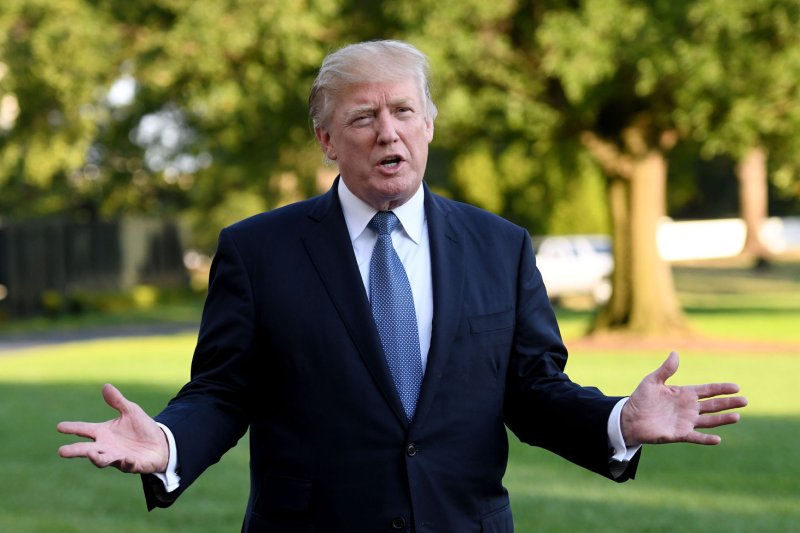1 of 3 | President Donald Trump answers questions from the press about a new executive order revising his travel ban, after arriving at the White House on Sunday. Photo by Olivier Douliery/UPI |
License Photo
Sept. 25 (UPI) -- The U.S. Supreme Court on Monday canceled arguments on President Donald Trump's original travel ban scheduled for Oct. 10.
Instead, the nine justices directed both sides to file briefs, limited to 10 pages, by Oct. 5 on whether two cases are "moot" after Trump issued an updated executive order Sunday night.
The U.S. Justice Department is defending one case against the International Refugee Assistance Project and another against the state of Hawaii.
"The cases are removed from the oral argument calendar, pending further order of the court," the justice wrote.
The previous order, which was 90 days, expired Sunday. The nation's refugee program was scheduled to expire next month.
On June 26, the justices ruled that parts of the travel ban issued in March should be in effect while the issue is pending.
This travel ban was a revised version of one issued in January. When that measure was blocked in several federal courts, Trump signed an order that removed Iraq from the banned list of seven nations. Also lawful permanent residents, known as green card holders, and current visa holders already in the United States will be permitted to stay.
The president ordered an updated travel ban Sunday night, which adds three new countries -- North Korea, Venezuela and Chad -- and removes Sudan from the list first introduced months ago.
The original ban, which was mostly blocked in federal court, prohibited travelers to the United States from Iran, Sudan, Libya, Somalia, Syria and Yemen. In addition to Chad, Sunday's action adds North Korea and Venezuela -- two nations that have seen rising tensions with the United States in recent months.
Restrictions for Somalia will be lessened for non-immigrant visitors, and restrictions against Iran will be relaxed for students. The new restrictions on Chad and North Korea ban all citizens from those countries. Restrictions against Venezuela apply only to government officials and their immediate families.
Trump's administration said the order is aimed to improve vetting for potential immigrants and increase national security.
Enforcement of the changes is scheduled to begin Oct. 18.
A White House statement cited a recent poll that found "a clear majority of voters" -- 60 percent -- support Trump's travel ban.
"The tougher, the better," Trump said of his order as he prepared to leave New Jersey for the White House late Sunday.
"Making America Safe is my number one priority. We will not admit those into our country we cannot safely vet," he later tweeted.
Trump's previous travel ban stalled in courts partly because it included only Muslim-majority countries. Opponents to the idea again expressed their disapproval of the new order.
"No amount of repackaging can disguise the fact that the intent behind the ban was and remains a noxious attempt to ban people based on their faith," Rep. Adam Schiff, D-Calif., a critic of the travel ban, said.
"The fact that Trump has added North Korea -- with few visitors to the United States -- and a few government officials from Venezuela doesn't obfuscate the real fact that the administration's order is still a Muslim ban," ACLU executive director Anthony D. Romero said in a statement. "President Trump's original sin of targeting Muslims cannot be cured by throwing other countries onto his enemies list."
The ACLU is one of multiple organizations challenging Trump's ban in court. It is scheduled to go before the U.S. Supreme Court on Oct. 10, the group said.
"This new Muslim Ban 3.0 is nothing but an extension of the same discriminatory policy first rolled out in January," the National Iranian American Council said.
"What remains the same? That the original intent behind this always was an attempt to ban Muslims," the National Immigration Law Center tweeted.















